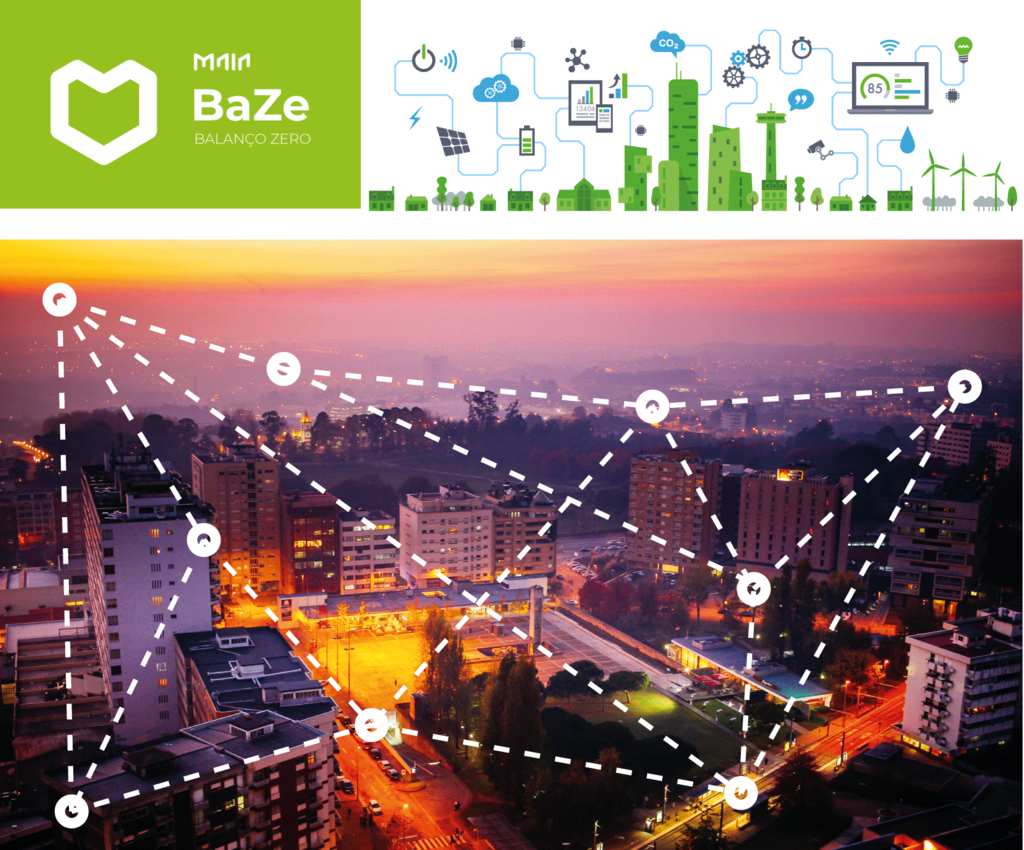Maia seeks to become a Smarter, Sustainable, Inclusive and Integrated Zero Carbon Community
Maia seeks to become a Smarter, Sustainable, Inclusive and Integrated Zero Carbon Community. In order to achieve that, and besides the activities conducted along the last months within SPARCS (organizing working team, data collection), the city has on going it’s Living Lab, called BaZe, a word composed by the two first letters of the expression Balanço Zero, expression that we use for our Carbon Neutrality goal.
The project intends to create in the Central Park of the city and the surrounding area, a space for demonstration of innovative ideas and solutions, not only products or services, but also procedures and new ways of doing and disseminating knowledge, in an organized and integrated way, and, most important, with a purpose.
This project has as main focus: to make the city of Maia, a conscious and responsible city, moving towards becoming carbon neutral, and, for that, the project has also to assure monitoring and evaluation, as the whole city has to know how are we behaving, what are our achievements, what didn’t go well and has to be changed, involving all within the collective responsibility of delivering this future to all citizens and the territory.
The project is focused on energy efficiency, sustainable mobility, and circular economy, as well as monitoring and evaluating the results, in order to assess the scalability potential of the solutions/technologies/procedures implemented in this domains.
Within this project, until now, we have on going:
The PAYT pilot project; The Air Quality Sensors; a Scooter Sharing Experience; an e-HUB; the Kiosk Zero; a Green Roof and a FabLab, but several other actions are programmed to be delivered during next year.
At the same time, we have several works and projects going on within our Rehabilitation and refurbishment action plan, financed under the EU Funds, to improve energy efficiency in Social Housing, in Sobreiro (11 buildings, comprising 94 social houses, representing a potential reduction of 48% in energy consumption in the first year after rehabilitation works (105.884,00 Euro) and 51% decrease in CO2 emissions, and 4 tower buildings, comprising 148 social houses, representing a potential reduction of 51% in energy consumption in the first year after rehabilitation works (142.637,00 Euro) and 46% decrease in CO2 emissions.
In the proximity of the city center of Maia, another operation financed by European funds in the scope of Energy Efficiency is still underway, corresponding to the rehabilitation of Maia I and Maia II social housing complexes. In this case, there are 6 buildings compriseing 122 social housing dwellings, representing a potential reduction of 39% in energy consumption in the first year after rehabilitation works (105.884,00 Euro) and 51% decrease in CO2 emissions.
It is also important to note that there is yet another operation to rehabilitate the buildings of Bairro do Sobreiro, in Maia, using European funding, but in this case it is no longer within the scope of Energy Efficiency. However, despite change of funding source, this other operation foresees a rehabilitation practically identical to the one concerning the 11 blocks of Bairro do Sobreiro mentioned above, but this one focuses on another 17 block buildings of Bairro do Sobreiro, contemplating identical actions in terms of energy efficiency and thermal comfort, which will certainly have proportional achievements in terms of potential reduction of energy consumption and CO2 emissions. In this case, there are 136 social housing dwellings covered.
Along with these energy efficiency interventions (housing buildings and public service buildings) we are also renovating all the surrounding public spaces, providing public green spaces and sustainable urban mobility.
We see all of these projects and activities as parts of the whole strategy under SPARCS, leading us to become a Positive Energy & Zero Carbon Community in 2050.

